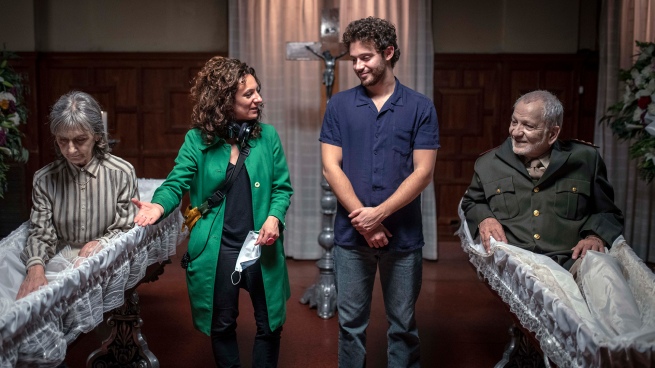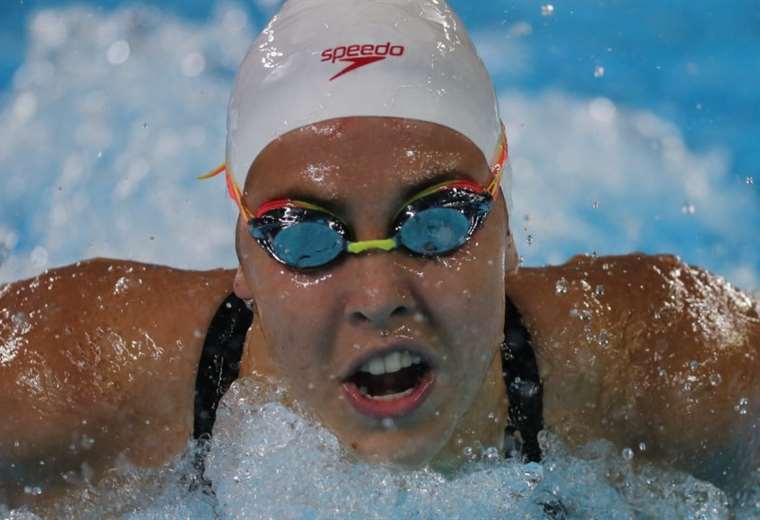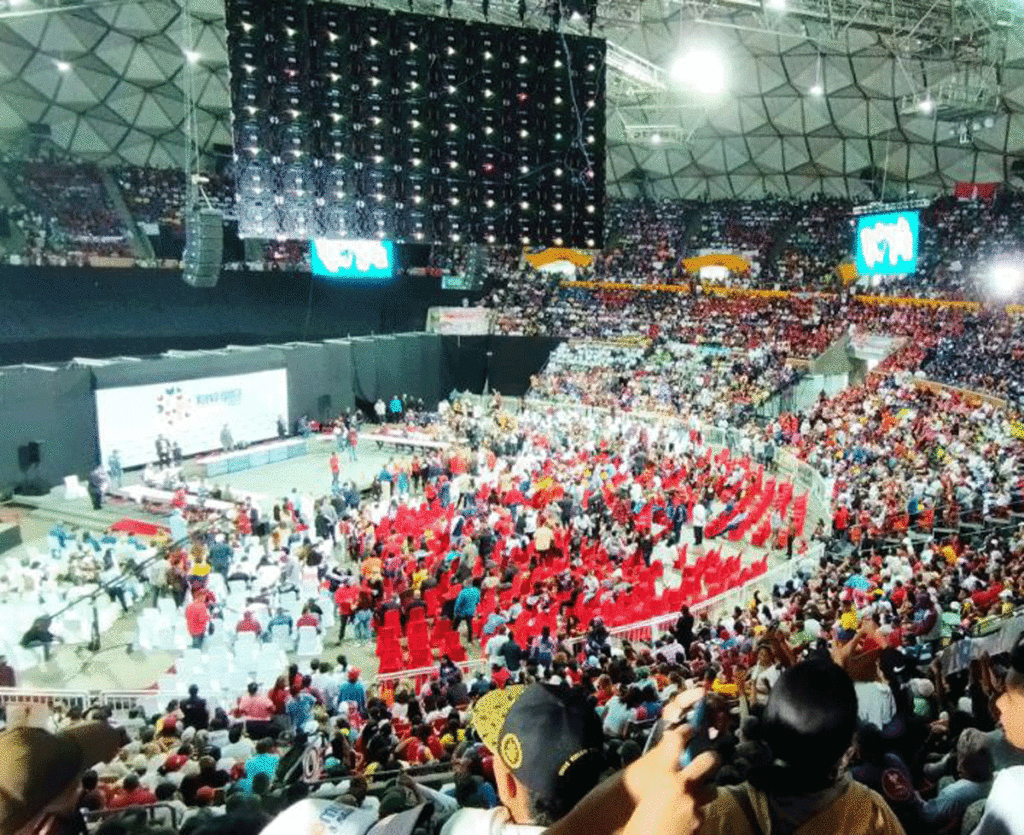The director, screenwriter and actress Ana Katz, director of “Supernova”, a new comedy-drama series on Amazon Prime Video and El Nueve that portrays a crucial moment of three characters on the difficult threshold of thirty, stated that she was attracted to the project because It allowed him to work on points “linked to the body, to sensitivity, to different ages and the demands imposed by a society like the one we live in today”.
“What attracts me most about a project is that it contains a question that I don’t know how to answer,” the director of “El perro que no calla” (2021) and “Sueño Florianópolis” (2018) explained in a chat with Télam, among more titles .
Produced by Kapow and Grupo Octubre, written by Katz together with his brother Daniel and made up of four half-hour episodes -which, in addition to being available on the streaming platform, will be seen weekly on air TV, on Fridays at 10 pm on El Nueve -, the original idea of the series was one of its protagonists, Johanna Chiefo.
She is Nicolasa, who along with her friends June (Ruggero Pasquarelli) and Mimí (Carolina Kopelioff) face social mandates, their own desires and frustrations while trying to survive in the big city.

Nico divides her days between advertising castings and the sale of empanadas by neighborhood businesses: when she finally gets a role, it is the leading role in an advertisement that misinterprets readings about fatphobia and she is stigmatized by the public as the “Fat fruit” .
June is stubborn in not accepting her diabetes and suffers an accident that takes her to the hospital and into the arms of her neighborhood greengrocer, José.
For her part, Mimí, a young actress who lives with her mother, spends her days in love with a well-known television producer much older than her, married and father of two children. The pressures of a lifetime of public exposure and her secret romance lead to a series of nervous tics that threaten to destroy her career.
Like a supernova, the leading trio lives in a permanent explosion, and the shock wave affects family, lovers and friends, including figures such as Inés Estévez, Marina Bellati, Luis Ziembrowski and Diego Cremonesi.

Télam: How did this project come about?
Ana Katz: The first idea for this project came from Johanna, who clearly feels like the alma mater and the seed of everything that came later. They offered me to write and reflect on Johanna’s idea, a proposal that interested me; I was interested in working on points linked to the body, sensitivity, different ages and the demands imposed by a society like the one we live in today. I really liked the idea of working on the sensitivity of the three characters and their family and emotional acquaintances; It is a series that is constantly talking about the possibility of failing, of the permission to fail, of the wounds generated by the effort of our contemporaneity.
T: “Supernova” tells the story of three young people in a difficult stage, trying to find their place in life, perhaps suffering the definitive passage to adulthood.
AK: The idea was a fiction that mirrors living in this Latin American reality. That is why the idea is that the characters of Nicolasa’s father (Ziembrowski) or June’s mother or also Mimí’s mother (Dupláa), are also mirrored in the children and have also complex situations. The series focuses on a generation of thirty-something, and gives it its leading role, but beyond that it is the kick of a sensation that has to do with a reality of today, and with which it is really not easy to come to an end of a month paying rent, it really isn’t easy to work or find a space, it’s not easy in the affective world either. And I liked being able from a warm context, because there is always an emotional bond between them, to explore that problem that also has families as protagonists.
T: An interesting aspect of the series is how Nicolasa deals with fatphobia, or how June deals with homophobia. They suffer discrimination, even that which is camouflaged in the form of “inclusion”, but at no time does that make them question their identity or want to be different. Do the younger generations have less of a problem with the gaze of others?
AK: Yes, from the beginning I was very interested in that leg of the project. Being able to ask myself questions about equality, about inclusion. I’m not sure if the answer to that lack of bias or less bias is a younger generation; there are younger groups that are much more open than past generations and we also see that there are other groups of very young people that are not, who perhaps tend to be more conservative. I think that depends, and it does surprise me and I observe that the range of contrast between a more inclusive and open thinking and a more conservative thinking is becoming wider.
I was very interested in being able to look inclusively and that, in my point of view, implies that these themes do not come with a didactic or discursive load, but that they can precisely be diluted in something that goes beyond all that, which is the humanity of each character.
T: How does this series dialogue with the rest of your work as a writer/director?
AK: That dialogue between fictions, between themes, is inevitable. The most important thing for me is the matter that is in the background and that is a kind of compass that makes me read, that makes me think, that makes me reflect. And I think that what attracts me most about a project is that it contains a question that I don’t know how to answer. I think that in relation, for example, to “El perro que no calla” there are issues that over time become more and more disturbing to me, such as, for example, the relationship between people and their jobs, the time spent on the affective, the increasing demand in contrast to the most sensitive needs of people and the demand also of Latin American society and the expression of that demand in the bodies.
T: What difference does the way in which a movie and a series circulate and talk to each other make for you?
AK: It is difficult for me to put series and cinema into dialogue because although they are endowed with audiovisual language, I think they work and have very different registers. In no way can I think of these two expressions in opposition. I think that the cinematographic experience is irreplaceable, walking to the cinema to see a film, getting together with people to discuss it. At the same time, it seems to me that the series provide an interesting space to reflect current problems with a lot of audience, that this allowed me to focus on characters, express some ideas that I plan to continue exploring.
“Supernova” premieres in Argentina on July 8
“Supernova”, the new dramatic comedy directed by Ana Katz can be seen from July 8 in Argentina on the Amazon Prime Video platform and on open television, through Channel 9.
The series stars a cast made up of Ruggero Pasquarelli, Carolina Kopelioff, Johanna Chiefo, Nancy Dupláa, Inés Estévez, Marina Bellati, Luis Ziembrowski and Diego Cremonesi.
The plot recounts an emotional journey of a group of young people who are in their 30s and, in an attempt to deconstruct the false social imposition that by that age everything has to be on track, they seek their own voice, identity and the place where they really belong. .
It has characters of different ages, who are directly related to the protagonists and who, from their conflicts, also carry out their own questioning of what is installed as established.
The story “portrays a turning point for three characters who are on the verge of thirty. Nicolasa, June, and Mimi.”
They “cope with social mandates, their own desires and their frustrations, while trying to survive in a big city”, highlights the information on the shipment.
Another of the characters that we will see in “Supernova” is Mimí (Carolina Kopelioff), a young actress who lives with her mother Elsa (Nancy Dupláa) and spends her days in love with a well-known television producer who is twenty-five years older than her, married and father of two children.
“Supernova” will feature four 30-minute episodes and will be available starting July 8.


















